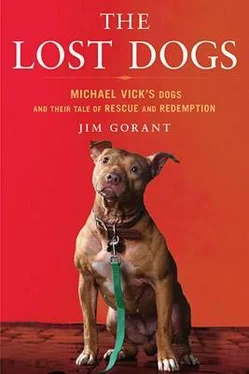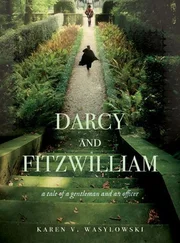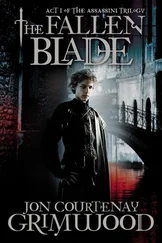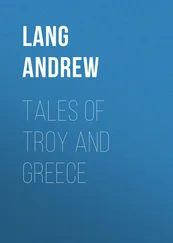
Jim Gorant
The Lost Dogs: Michael Vick's Dogs and Their Tale of Rescue and Redemption
Author’s note: There are a few scenes in this book, particularly ones that re-create the lives of the dogs both before they were seized by the government and while they were living in shelters, that I obviously could not have witnessed or know firsthand. In those instances I’ve made every effort to present as close to a true version of events as possible based on conversations with witnesses, dog behavior and dogfighting experts, law enforcement officials, and shelter workers and by making extrapolations from legal documents.

An article I wrote about the Michael Vick dogs appeared on the cover of the December 29, 2008, issue of Sports Illustrated. In the weeks after, the magazine received almost 488 letters and e-mails about the story and the dog pictured on the cover, the most we got in response to any issue for that entire year. By an overwhelming majority the letters were supportive, but there were some detractors.
My greatest fear was a flood of complaints from people with friends or loved ones that had been injured or lost to pit bull attacks, but there were remarkably few of those. Most of the complainers fell into two groups. The first asked, “What does this have to do with sports?” A fair question, if you take the narrowest view of the subject. If all you want from your subscription are games and players and straight-up analysis, then that’s a legitimate gripe. I would argue, however, that what defines Sports Illustrated and has set it apart for more than fifty years are well-told stories that attempt to put sports into a larger perspective, to offer a deeper and broader view of how the people and events in question reflect and contribute to the larger social and moral makeup of our society. To each his own, I suppose.
The second complaint was more troubling. In its simplest incarnation it usually went something like this: “Why does it matter, they’re just dogs?” The more verbose in this camp might elaborate: “People are dying and starving every day and we’ve got bigger problems. No one cares if you kill cows or chickens or hunt deer. What’s different about dogs?”
What is different about dogs? I had not directly addressed the question in the article. On some level it seemed obvious to me, but at the same time I couldn’t put a satisfying answer to words. As I started work on this book, the question hung over my head. As I was interviewing experts, reading books on canine history and behavior, touring shelters, and talking to dog lovers, I processed a lot of the information through the prism of that question.
The answer, cobbled together from all those readings and conversations, took me back to the beginning. Men first domesticated dogs more than ten thousand years ago, when our ancestors were hunting for their meals and sleeping next to open fires at night. Dogs were instant helpers in our struggle for survival. They guarded us in the dark and helped us find food by day. We offered them something, too, scraps of food, some measure of protection, the heat of the flames. In an article about the origin of dogs that ran in the New York Times in early 2010, one expert on dog genetics theorized that “dogs could have been the sentries that let hunter-gatherers settle without fear of surprise attack. They may also have been the first major item of inherited wealth, preceding cattle, and so could have laid the foundations for the gradations of wealth and social hierarchy that differentiated settled groups from their hunter-gatherer predecessors.”
Certainly, as man rose in the world, dogs came with us, perhaps even aiding the advance. They continued to guard us and help with hunting, but they did more. They marched with armies into war, they worked by our side, hauling, pulling, herding, retrieving. We manipulated their genetic makeup to suit our purposes, crossbreeding types to create animals that could kill the rats infesting our cities or search for those lost in the snow or the woods.
In return we brought them into our homes, made them part of our families. We offered them love and companionship, and they returned the gesture. From the start it was a compact: You do this for us and we’ll do that for you.
Our relationship with dogs has always been different than it has been with livestock or wildlife. The only other animal that comes close is the horse, which has undoubtedly been a partner in our evolution and a companion. But a horse can’t curl up at the bottom of your bed at night, and it can’t come up and lick your face when you’re feeling down. Dogs have that ability to sense what we’re feeling and commiserate. There’s a reason they’re called man’s best friend.
As for why our bond with them matters, there are reasons for that, too. If you hang around animal activists for a while, you’ll inevitably hear repeated a famous Gandhi quote: “The greatness of a nation and its moral progress can be judged by the way its animals are treated.” The idea being that in order to lift the whole of society, you must first prop up the lowest among its many parts. If you show goodwill and kindness toward those who cannot stand up for themselves, you set a tone of compassion and goodwill that permeates all.
To this day, I believe Donna Reynolds, one of the founders of Bay Area Doglovers Responsible About Pitbulls (BAD RAP), a rescue organization at the center of the Vick case, said it best. “Vick showed the worst of us, our bloodlust, but this [rescue effort] showed the best. I don’t think any of us thought it was possible-the government, the rescuers, the people involved. We like to think we have life figured out, and it’s nice that it can still surprise us, that sometimes we can accomplish things we had only dreamed of. We’ve moved our evolution forward. Just a little bit, but we have, and I’m happy to have been a part of that.”
I’m happy to have witnessed the effort and told the story.

April 25, 2007, to August 28, 2007
A BROWN DOG SITS in a field. There’s a collar around her neck. It’s three inches thick and attached to a heavy chain, which clips onto a car axle that’s buried so one end sticks out of the ground. As the dog paces in the heat, the axle spins, ensuring that the rattling chain won’t become entangled.
The dog paces a lot, wearing a circle in the scrubby weeds and sandy soil around the perimeter of the axle. She paces because there’s little else to do. Sometimes a squirrel or a rabbit or a snake crosses nearby and she barks and chases it, or she lunges and leaps after the dragonflies and butterflies that zip and flutter past.
She flicks her tail at mosquitoes and buries her muzzle in her fur, chewing at the itchy crawly things that land on her. If she’s lucky she digs up a rock that she can bat around and chew on, but otherwise there are just the weeds and the bugs and the hot sun inching across the sky.
She is not alone. Other dogs are spread around this clearing in the trees. They can see one another, hear one another bark and whine and growl, but they can’t get to one another. They can’t run, they can’t play, they can’t anything. They can get close to their immediate neighbors, stand almost face-to-face, but they can never touch, a planned positioning meant to frustrate and enrage them. For some it does; for many it simply makes them sad.
Читать дальше















